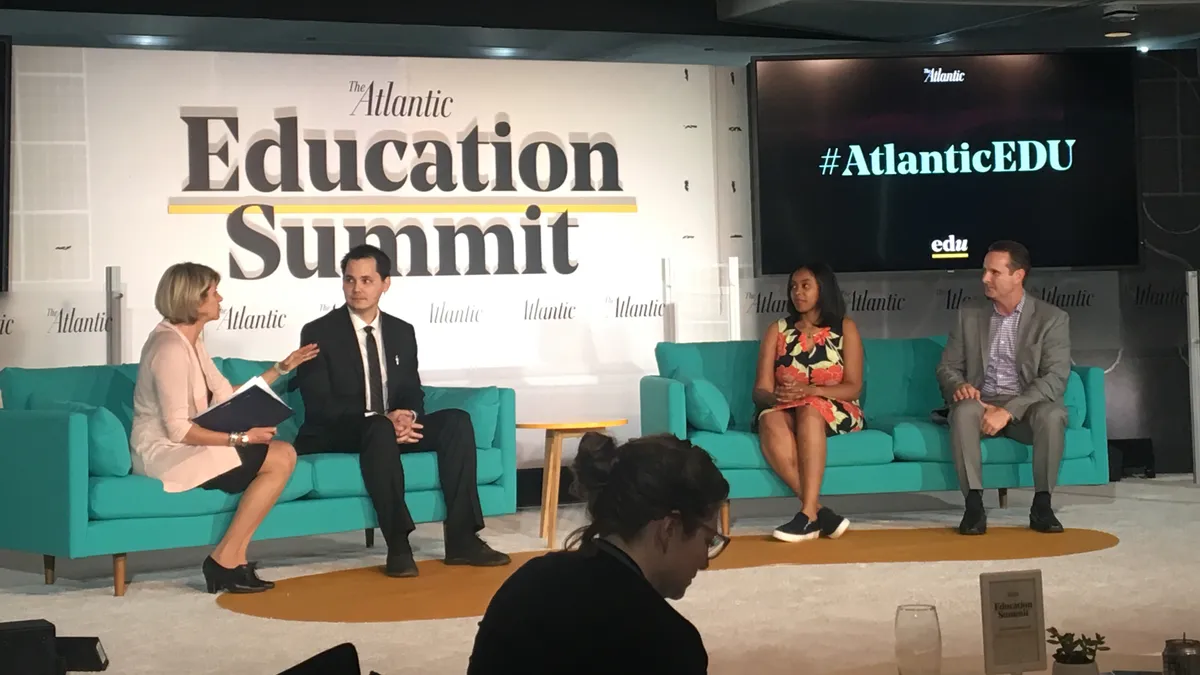Dive Brief:
- In a Tuesday session at The Atlantic Education Summit in Washington, The Hechinger Report Editor-in-Chief Liz Willen led a discussion of what constitutes personalized learning and how it benefits students. Truesdell Education Campus (DC) math teacher Tequilla Thomas, for example, described personalized learning as students being able to not only facilitate their own learning, but that of their peers. Her students use the Summit platform, which allows them to use their own data to drive their instruction while also seeing which peers are succeeding and can help them.
-
The Vista Unified Public Schools (CA) started by using an XQ grant to restructure Vista High School into a format allowing students to own their “learning story,” explained Assistant Superintendent Matt Doyle. Teachers serve in an active support and guide role as students go back and forth in four core blocks working on interdisciplinary projects, setting their own goals as the teacher supports them and moves them along.
- Meanwhile, Chicago-based LEAP Innovations has received a $14 million grant from the Chan-Zuckerberg Initiative in its partnership with Chicago Public Schools and Chief of Learning Innovation Chris Liang-Vergara said the organization is working to drive a community-led process to personalize learning with a focus on the whole child, including factors like academics, healthcare and social-emotional learning alongside research on evidence-based practices.
Dive Insight:
Personalized learning is one of the most popular buzzwords in education today, to the point that flashy sales pitches from vendors have co-opted it for any number of tools that don't always necessarily fit the core idea. Simply put, the idea is to give students more agency, with those who are at level or ahead of level positioned to assist those who are behind via peer learning, and with the teacher serving as a "guide at the side" rather than a "sage on the stage" who just speaks at students.
Of course, the approach requires plenty of stakeholder buy-in — not just from teachers, but from parents and students as well. In Vista Unified, Doyle said the XQ grant proposal was written in collaboration with parents and students following complaints that students at or above grade level weren’t being challenged enough. The district's model now also gives parents monthly opportunities to come in and engage with their student and see how they're navigating their own learning pathways.
Ultimately, the model should serve to better reinforce high-demand soft skills like collaboration, perseverance, empathy and communication alongside the core skills students should gain from the classroom, often with more interdisciplinary project opportunities that better fit students' particular interests and needs.
Thomas noted that through personalized learning, her students have now learned to advocate for themselves and have developed skills they can use in life beyond the school walls, not just on classroom assignments. Feedback has empowered younger students to be reflective, with intrinsic motivation improving achievement as a result. Her school starts having students use the Summit platform at 3rd grade.
Doyle added that a huge infusion of funds and support like an XQ grant isn't necessary for a district to start heading down the path to personalization. It’s all a matter of how the district chooses to use its budget, but the key is to move slowly and strategically. Vista Unified's goal is to develop students who are excited about learning and are flexible and nimble in a society that's still not sure what the jobs will be 10 years from now, with the soft skills to succeed immediately even if they don’t go on to college.
Additionally, Liang-Vergara made a point of alleviating concerns that personalized learning technology would lead to eliminating teachers from the picture entirely, adding that you can’t buy personalized learning by purchasing furniture and tech. He called it a "paradigm shift" to focusing on a whole-child approach around agency, student-led conferences, self-awareness and cultural awareness.







 Dive Awards
Dive Awards





